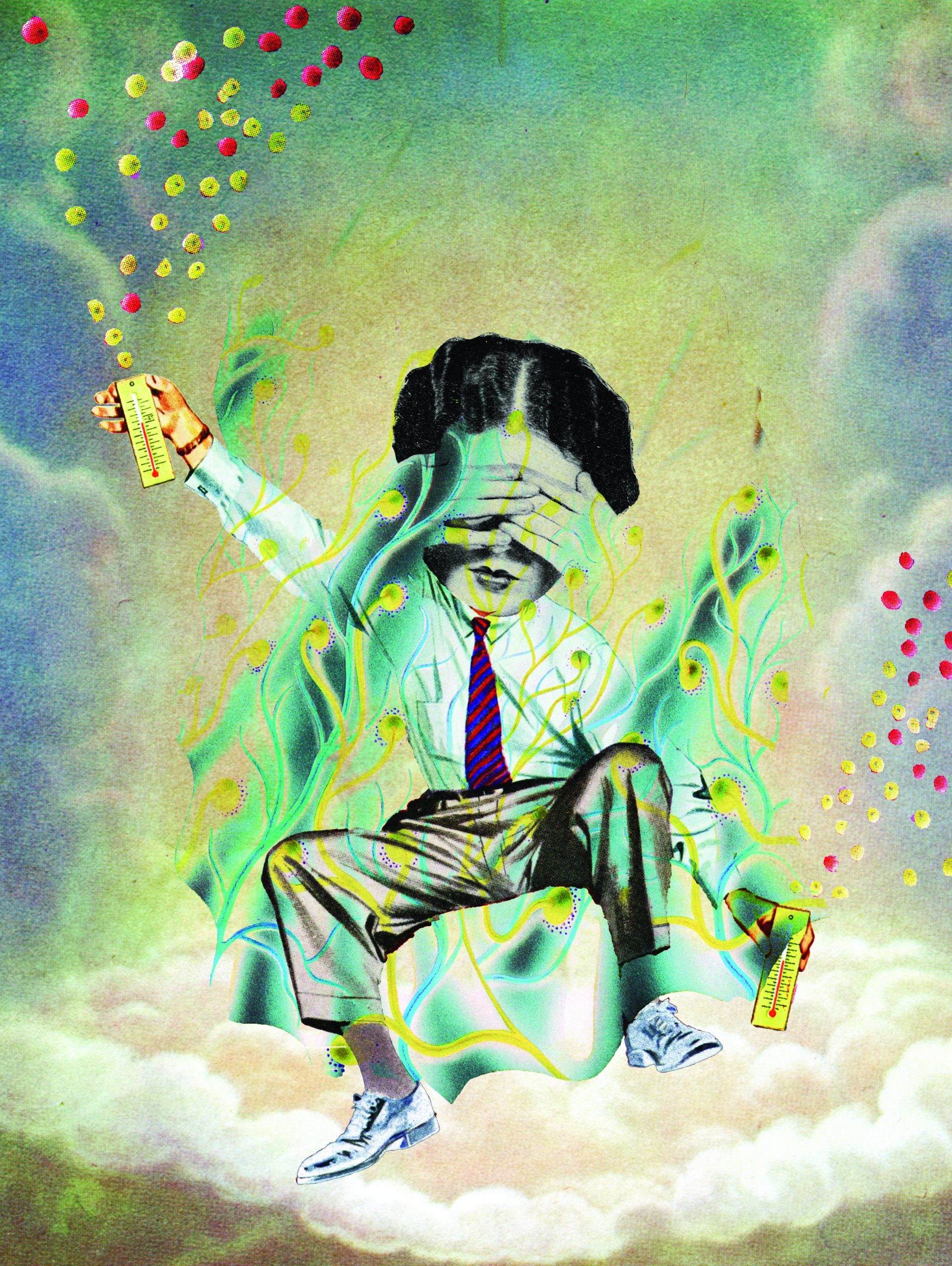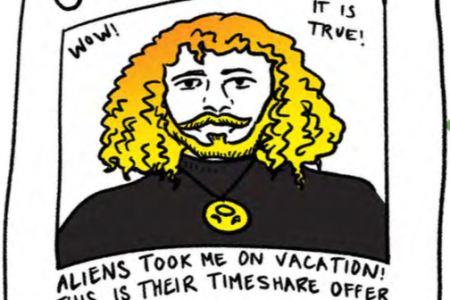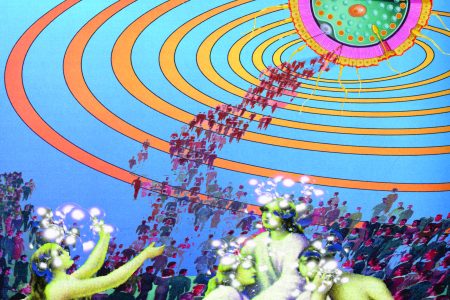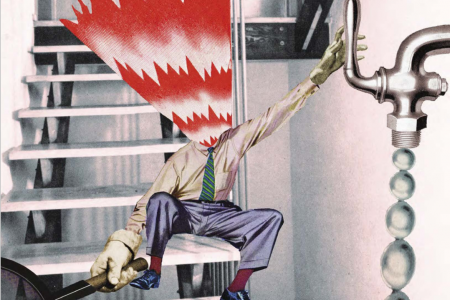
Rusted Bones
by A. E. Chandler
I remember thinking it was going to rain. Not because there was any sign in the sky, but because of the ache in my knuckles. Arthritis. It started last year, when I was fourteen. Everyone in my family has arthritis, starting in their teens.
Except Pete, my seventeen-year-old cousin. He came to live with us just after my hands started aching before storms. Pete used to live with his mother, but she went missing. No one ever found out what happened to her.
Just like Marianne Delmonte, the love of my life. Marianne with the curly red hair who, when we were six, told me she’d marry me if I braided her a crown out of daisies and dandelions. The stems broke when I tried knotting them, and scotch tape wouldn’t stick; the stems were too moist. But Marianne kissed my cheek for trying.
We grew up and the freckles on Marianne’s nose faded; she didn’t wear crazy patterned socks to school; and she stopped telling people green apples tasted better than reds. We went on two dates, but Marianne said I felt more like a friend, and two months ago she started dating Pete. But that can’t change the fact of a certain person being your lifelong love.
“Are you sure about this?” Pete asked, driving his truck down the highway.
“Everyone’s looked everywhere else. We owe it to Marianne to check, even if the police don’t think it’s worth it.”
“Big surprise. Once when you were six she wanted to come to this part of the forest to find a witch’s gingerbread house. Frick, Raymond.”
“She said the trees on these hills looked magical, but evil somehow, like they were under a spell. Maybe she came here looking for magic.”
“Or maybe she was trying to forget about seeing me and Tricia Lewis behind the auto shop.” Pete struck the steering wheel.
“You’re stupid.”
“I know. It’s new.”
Pete took us off the highway, onto a pair of dirt tracks almost overgrown with grass. The hiss of rushing air died away, replaced by a rumble from the ground as we rolled over it. I could have stretched my arm out the window and swatted the leaves, as they blotched poppy red before disintegrating to a brownish grey, and exposing ghost coloured trunks with black scars, where branches had broken, or an animal had scratched its scent. Some trees closer to town had initials carved in them, or swastikas, carved by kids who didn’t understand what the Nazis had done, or what it meant to take a life. These trees were too far from town or anything else for people to use them as message boards.
The tracks tilted up slow, tracing the hill’s curve.
I nodded. “See that silvery pine alone in the leafy trees?”
“Yeah, so?”
“Marianne called those witches’ nests.
She said winter was a spell that witches cast to make the leafy trees look like their own clawed hands, while they hid snug in their silvery evergreens. But by spring the witches would be so tired they couldn’t keep up the spell, and everything would grow again. During summer the witches would sleep and regain their strength until fall, when they’d be at their most powerful.”
Pete pushed his fingers hard into the steering wheel. “Silvery witches’ nests? Don’t you have any memories of Marianne from after puberty?”
“She told me that five days ago.” I put my hands in my lap. “It was the last time I saw her.”
The tracks went under a bunch of saplings. We stopped and got out of the truck. I felt glad we had to walk. When Pete drove, I had to sit beside him and do nothing.
“How far?” Pete asked, as we continued on the trail.
“Until we find her.”
“She’s not here. We should be looking somewhere else.”
“Leave if you want to.” I stomped ahead, outpacing him. Why did Marianne have to see the good in everyone — in him?
Our feet slapped and crunched up smells of dust and moldy leaves. Even freshly cut grass doesn’t smell fresh in the country, but like a breeze coming off the wrong end of livestock. In the country, nothing is new.
We walked for three hours — easy in a forest, because trees aren’t spaced like city blocks; we passed more distance, but didn’t realize how much. Steel-coloured clouds had slipped in front of the sun. A dull pain pulsed in my knuckles, shooting waves toward my fingertips, but falling short.
“Raymond, does anybody live up here?” “No one.”
“So what’s that house?”
I followed Pete’s finger through the trees, where scattered tins and milk jugs were being swallowed by grass and earth. “That’s not a house; that’s a cabin. An old one.” One with grey wood fraying like an old afghan. The fields and hillsides were haunted by these cabins, roofs sagging, windows showing lacy webs of cracks. But, oddly, this roof was stretched taut; these windows were streaked with dead rain, but were intact.
“We should check it out,” Pete said.
He ran. He ducked branches, jumped roots, and I almost twisted my ankle trying to keep up. I read Chambers v. Marsh, while Pete played soccer and baseball. I don’t think Marianne liked him better because of that; she should have liked him less.
Something happened the closer we got to that cabin. It felt like arthritis foretelling a storm, only instead of my hands, the sensation penetrated my entire body.
Pete pounded on the door, then turned its handle and put his shoulder into it. The door wagged, showing the stump of a deadbolt.
“Pete, what are you doing? It’s locked! This is breaking in.”
“Marianne might be in there.”
“She’d answer.”
“Maybe she can’t.” Pete threw himself
twice more against the door. It popped open. The bang echoed off the inside walls, but there weren’t any other sounds.
“This is really stupid.”
“Get your butt in here.”
I followed Pete inside.
He used to have this pair of jeans — his favourites. Pete wore them every day for a month. Then one day he took them off and forgot about them, wadded and unwashed in a corner of his closet, where they stayed all summer.
The cabin smelled like Pete’s old jeans, like people had lived and sweated here. And then vanished. Maybe they left, or were taken, or died, but wherever they went they’d forgotten to take their smell.
“This furniture’s half rotted.” Pete kicked down on a chair leg, snapping it so the chair boomed on the plank floor.
“Don’t!”
“Why? Nobody lives here.”
A bookcase leaned out from a wall, ready to topple. Bedroom, kitchen, and living room had been crunched together in one room, and this was the only bookcase — full. I tried to free one of the volumes. It stuck and the case wobbled.
“What are you trying to do? Kill yourself?”
“Pete, these have cloth covers — they’re valuable. Who would leave them?” “Someone who finally got a television.”
A sound flared into the cabin. It was like a rabbit’s death scream inside a cougar’s growl, amplified forty times. I started for the front door, but Pete shot out the back. Towards the sound. Not wanting to be a coward, I jogged after him.
As we ran through the trees behind the cabin, I realized we were following a path. I could see light between the trunks ahead — a clearing.
I shook the closer we got. “Pete!” A cold bubble pulsed in my brain. I didn’t want to find whatever had made that sound.
Pete stopped short on the edge of the clearing. I had plenty of space to slow down before creeping up behind him. It had always bugged me before that Pete was taller, and just all around bigger than me. Right then it didn’t. I peeked around his tricep. It was trembling.
“Frick. Raymond.” There wasn’t any voice in Pete’s voice. “It’s a graveyard.”
We stood in a clearing the size of three tennis courts. The trees edging around it were no thicker than pool cues, bark puckered in sores and scratches, leaves a deep yellow, like stale piss.
Inside the clearing were thousands of red-grey leaves, inches deep. Collectively, they looked like they’d been eaten alive by the air and digested into something undead — eaten from the outside in, bulging and withering with rust.
A smell like mealy pork wound up my nostrils. Where it stuck. And built. And built.
Tombstones, infected with rust-coloured algae, rose out of the fallen leaves. Each with a person sitting, leaning back against it.
Shackled wrist and ankle in front of every tombstone sprawled a corpse, head thrown back, mouth gaping, like each was trying to breathe with rotted lungs.
Laying on the grave closest to us was a skeleton, held together with ligaments like dirty shoelaces. To our right another body, skin gone brown and chipped. Even with its nose sagging into its skull, it looked like a person — just a person whose guts had collapsed, stomach suctioned to their spine. Fungus flowered on the protruding tongue of a body to our left. Its scalp had come loose and rested on the tombstone, beside the head, hair dangling over one shoulder. A pair of spectacles perched on another corpse’s face, not fogged, not cracked, but so perfectly clear that they didn’t seem to have lenses in their sockets.
“See the glass?” Pete pointed to the ground. To the leaves of rust that were slowly, slowly creeping up the bodies and slurping them into the earth. Broken shards mixed with them, reflecting them, camouflaged.
“Look.”
We beheld a hump, farther out in the graveyard. It was too big for a headstone, though from behind, it resembled one, though less and less the longer I stared at it. Then it came into focus: an oval mirror frame, one of those old-fashioned standing ones, with its back to us, propped at the foot of a grave.
We stood there. It could have been two minutes altogether. Or ten. As many as fifteen, I guess, though that seems as likely as two. I only have two minutes’ worth of memory during that time. The smell clogged my brain. What I remem- ber next doesn’t make much sense. I suppose that’s why I dream about it so much: my brain is trying to piece things together, but I’m not sure I want to.
I remember stepping carefully across the glass, afraid a green blade would slice through one of my tennis shoes and maim me. I tried not to trip on the rusting, oval frames of broken mirrors. Then looking around the only standing mirror and finding curly red hair — copper red — and pale skin, a lot of it, dotted ghostly copper. Marianne: naked, bloody. A half clenched hand, an iron bracelet — so wide — and a hole in her wrist, deep and red and ragged. I remember turning around and seeing it all again, wrong way around. The mirror.
A shadow, moving around the silvery witch’s nest. Pete running after it. Whomp! A man — short, only as tall as me — slumped back on a tombstone. His eyes closed, his wrists and ankles shackled.
Then it was like swimming up to the surface, and I was arguing with Pete.
“We can’t do this,” I said. “It’s wrong.”
“He deserves to know how it feels. We won’t let him die.”
“We’ll get in trouble.”
“We tell the police this guy is a big-time murderer and he tells them we locked him up for a few hours. Who do you think they’ll believe? Look around!”
I didn’t look. I’d seen enough.
“Even if the police believe him, they won’t do anything to us; we’ll be heroes.” The man groaned. The same sound a cow makes lumbering toward its feeding trough. The hair on his balding head bristled black or white, not a single strand was grey. He had a plain, regular face, with some lines about his mouth and bluish-grey eyes the same colour as his jeans and jacket. He was a plain, regular man.
“He couldn’t have done this,” I said.
“You said no one comes here. If he’s here, he must be the one who did this.”
The man glanced down at his body, not reacting. Then he closed his eyes and groaned again. “Unshackle me, kids. My head’s pounding. I need a doctor real bad.”
I started bending down, but Pete pushed my chest and I straightened.
“Marianne Delmonte was my girlfriend.”
The man’s expression stayed the same.
I wondered how hard Pete had bashed him.
“That’s great, kid. Now can you help me out?”
“You killed her.”
“I never killed anyone. Please, kid, I need a doctor.” His face didn’t change at all, like he was wearing a rubber mask, thicker than a car tire.
Pete growled, striding to the mirror and flinging it back toward the ground.
There was a sound like wind chimes falling on a cat.
It wasn’t Marianne. It was like someone had made her into a Halloween costume. Like someone had vacuum sealed her skin to her skeleton. Drained the blood from her lips and poured it down her chin. Carved bites deep into her wrists.
“She’s dead!” Pete turned back to the man. “That’s your fault!”
“I didn’t kill your girlfriend. I saw her as she was and I made her beautiful.”
“They’re lucky.” The man glanced around the graveyard, finally his face showing pride. “They get to die beautiful. I give them mirrors, let them watch.”
“We should leave him here,” Pete said. “Let him starve like they did.”
I shook my head. “She deserves to be buried. Not in this graveyard. We have to tell.”
“Then we’ll wait.”
“The police will figure out what we did. Pete, we’ll go to jail; we won’t graduate. We won’t do anything.”
Pete smiled. “She screamed right before she did it, you know. To get up her courage. If we’d run faster, if we hadn’t been scared, hesitated at the edge, we could have saved her.” He got out his cell phone, holding it up for a signal, wandering back toward the house.
“No self-control,” the man told me. “These girls get hungry, they’ll eat anything.”
I knew I didn’t want to cry in front of him. “Her favourite flowers were daisies. She ate only green apples.”
The man grinned. The same way a hyena grins when the limping wildebeest spots it and, for an instant, the animals can see through each others’ eyes. “The first time I came for her, she cried. The last time she rolled her head and moaned. They never like the first time, but they get used to it.”
The glass shard I picked up pricked my palm. I remember looking down at the shard, seeing my reflection, before his blood slipped over it. Marianne never ate red apples. My whole hand — up to my elbow, almost — felt warm and slimy. And red.
Like the leaves. Or rust.



